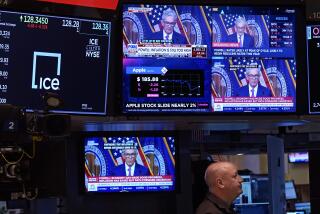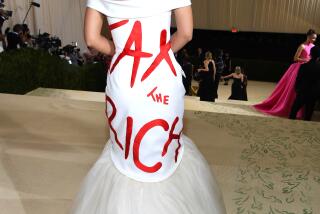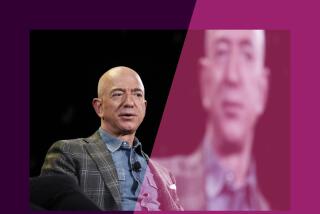Income inequality is not a concern of Wall Street’s money addicts
- Share via
The richest 1% of Earth’s citizens own 46% of global wealth. That news comes to us from the annual World Economic Forum in Davos, Switzerland. Even more dramatic is this statistic: The planet’s 85 wealthiest people have wealth equal to that held by the poorest half of all humans.
Restated with all the zeros on display, that is a ratio of 85 to 3,500,000,000.
The study that came up with these facts comes from Oxfam International, a British humanitarian organization. Oxfam concludes that this enormous concentration of wealth and power in a few hands perpetuates poverty, increases inequality and undermines democracy. The group is asking Davos participants -- some of the richest people in the world -- to step in to help close the income gap by supporting higher taxes on the wealthy and elimination of tax dodges, as well as living wages for workers, expanded educational opportunities and guaranteed healthcare for everyone.
In the United States -- the country that is leading the way in the shift of wealth into fewer and fewer hands -- we will see how the rich respond. If they are anything like the “greed is good” crowd on Wall Street, Oxfam’s pleas will be met with derisive laughter, if not an extended middle finger.
Most rich folks love their money and are not eager to share. As evidence of this, consider the commentary in the Sunday New York Times by Sam Polk, a former Bank of America trader who handled wildly lucrative bond and credit default swap deals. Polk’s account confirms that the money addiction portrayed so vividly in Martin Scorsese’s hit movie, “The Wolf of Wall Street,” is a real and driving force in the financial industry.
Polk said he and the even-richer wheeler-dealers around him were never satisfied that they were compensated well enough. His last year on Wall Street, Polk was deeply disappointed that his annual bonus came to a mere $3.6 million. He never felt secure in his riches and there came a moment when he realized that his bosses who raked in far greater compensation were just as insecure.
“From that moment on, I started to see Wall Street with new eyes,” Polk said in the article. “I noticed the vitriol that traders directed at the government for limiting bonuses after the crash. I heard the fury in their voices at the mention of higher taxes. These traders despised anything or anyone that threatened their bonuses. Ever see what a drug addict is like when he’s used up his junk? He’ll do anything -- walk 20 miles in the snow, rob a grandma -- to get a fix. Wall Street was like that.”
Money addicts are not inclined to feel a sudden burst of compassion for the poor. They are more likely to continue to do as they have done for years: buy influence in Congress and state legislatures to protect what they have and get even more.
Giving huge tax cuts to the wealthy was not an idea Republicans dreamed up without prompting from those who would benefit most. Too many politicians of both parties eagerly serve their wealthy campaign benefactors. No matter what the statistics may say about the gulf between the people at the top of the economic ladder and the many at the bottom, it is hard to imagine many rich people -- apart from the rare few, such as Bill Gates and Warren Buffett -- urging politicians to shift any major part of the nation’s wealth away from those who now have it and toward programs to educate and train the people stuck in poverty or increase the wages of workers struggling to put food on the table or pay the rent.
Reading the statistics and observing the politics, it is easy to see why the United States is fast becoming the world’s biggest banana republic.
More to Read
A cure for the common opinion
Get thought-provoking perspectives with our weekly newsletter.
You may occasionally receive promotional content from the Los Angeles Times.











